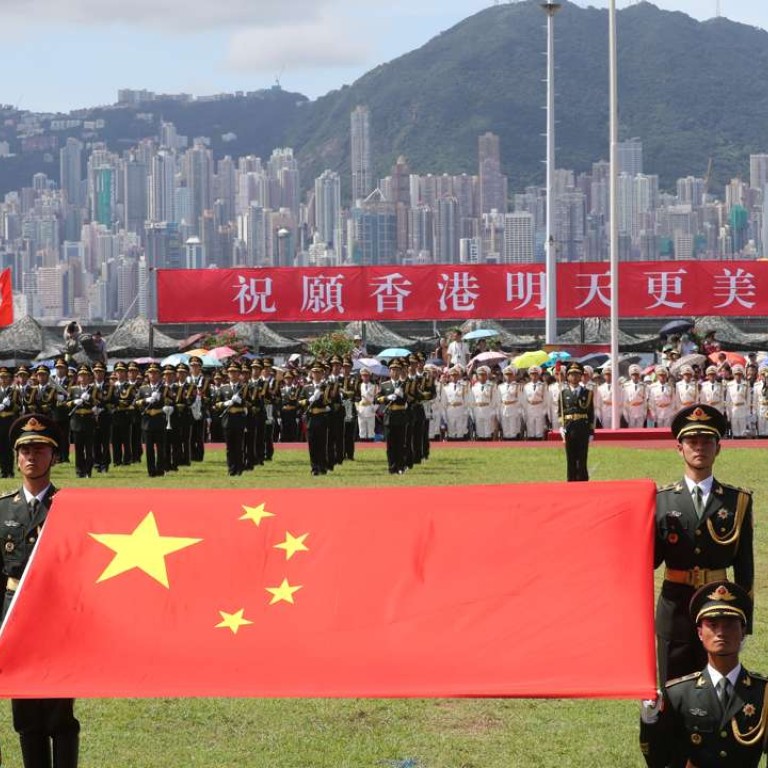
Why Hong Kong’s struggle for autonomy cannot follow Singapore’s path to independence
Zuraidah Ibrahim says localists should know the circumstances of the Lion City’s separation from Malaysia before drawing inspiration from Singapore
If Singapore could do it, why can’t Hong Kong? It is a line one hears now and then in this city’s policy debates.
The two have always invited comparisons. In the past, Hongkongers looked south with contempt at Singapore’s state-led development and its lack of political freedom. Many have become a little more wistful. Buffeted by unforgiving economic forces and unable to afford decent homes, they have a new appreciation for the nanny state.
More recently, though, the comparison has taken a less rational turn. The Lion City has become a symbol to some of what an independent Hong Kong could be.
“If Hong Kong and China can separate, as Malaysia and Singapore did in 1965, this is good for both sides,” Martin Oei, 38, a localist told foreign media. A young friend suggested to me that, given their comparable size, Hong Kong can tread the same path as the Lion City. Another commentator argued: “When Singapore left the Malaysian Federation in the 1960s to go it alone, it didn’t go thirsty or hungry.”

New party seeks Hong Kong’s independence, via return to British rule
Singapore is the only majority-Chinese society outside the People’s Republic of China whose sovereignty is unquestioned. So it is not surprising that it would enter the consciousness of those desperate to protect Hong Kong from Beijing’s dominance.
Calls for independence represent only a small minority of Hongkongers, but they are on the rise, as evidenced by the breakaway demonstration during Friday’s traditional July 1 protest. Perhaps it is all just an intellectual exercise, arising from despair with the status quo. Perhaps it is playing the nationalism card to win a seat in the upcoming Legislative Council election. That is Chief Executive Leung Chun-ying’s take, as he told the Post last week.

Beijing will use law and public opinion to handle Hong Kong independence issue, not guns, insists prominent lawyer
Whatever the underlying impulse, comparing Hong Kong’s struggle for autonomy to Singapore’s road to independence is tenuous, based on cherry-picked facts mixed with a dollop of delusion.
Yes, the Singapore story shows that a small city state can thrive in a modern world with open trade. Indeed, in the latest IMD World Competitiveness Rankings, for example, seven of the top 10 were territories with populations of under 10 million. Hong Kong was number one, and four of the other six have fewer people than the SAR – Singapore, Denmark, Ireland and Norway.
As long as borders remain relatively open to trade and investment, a state the size of Hong Kong need not be economically doomed.
As Singapore’s former foreign minister George Yeo once noted, being small confers advantages, chief of which is a city state’s ability to regulate the inflow of people. Thriving cities in larger countries suck people in from their hinterland, which “swells the population of the city making large parts of it unattractive”. Hongkongers have no trouble picturing this scenario – it is their daily reality.

In denial: Hong Kong independence calls ignore the inextricable link to China
But small states are also vulnerable. They must be able to defend themselves. “Otherwise … we would be eaten up,” Yeo noted simply.
Economic viability, therefore, is only half the story. To be independent, realpolitik dictates that you need the blessing or, at least the benign neglect, of big powers that can do you harm.
Singapore was lucky in this regard. A fading British empire gave up its Southeast Asian colonies without much of a fight. Singapore’s version of localists were lifted by the global tide of decolonisation. Interestingly, Singapore’s anticolonialists in the 1950s didn’t regard their city as a viable independent entity. Singapore decolonised by joining Malaysia in 1963. But Singapore was soon booted out. It is probably the only nation-state whose independence was immortalised by television pictures of its leader in tears – not of joy, but of “anguish”, as Lee Kuan Yew himself described the moment.
Radicals are breaking the law by calling for Hong Kong independence, says Beijing diplomat
Few countries have had independence thrust upon them the way Singapore did in 1965. The good fortune did not stop there. Despite initial belligerence, its humongous neighbour Indonesia turned inwards over the next few decades, posing little threat to an island 50 times smaller.
So, when I hear people say Hong Kong could do a Singapore, I wonder if they are familiar with the details of Singapore’s independence story.
True, there are other role models for nationalist movements. Post-Brexit, Scotland is talking again about breaking away from the United Kingdom. Both sides are conducting themselves with utmost civility. We are unlikely to see tanks on the streets. If the Scots brandish umbrellas, it will be in defence against inclement British weather, not tear gas.

Peaceful calls for Hong Kong independence are protected by Bill of Rights, ex-top prosecutor says
But, for every Scotland, there is also a Kurdistan, a Ukraine and a Palestine, nations whose dreams of freedom are crushed with brute force by powerful opponents.
The question for Hong Kong’s nationalists is what kind of power they think they are up against. Do they expect China to respond with the magnanimity the UK is showing toward Scottish nationalism? Or like, say, Vladimir Putin’s merciless taming of Ukraine and Chechnya?
Those calling for independence are convinced that Beijing is a cruel imperial overlord – more like Moscow than London. Ironically, the more accurate their impression of Chinese power, the less rational is the hope that Hong Kong can follow in Singapore’s fortunate footsteps.
Zuraidah Ibrahim is chief news editor. Follow her on twitter @zuibrahim

